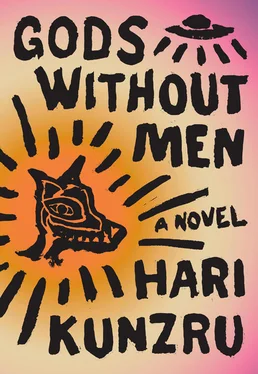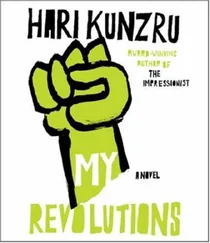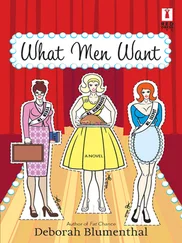There was a howling sound, like a dog. There was a child’s voice, calling out a word, perhaps a name. There were horse’s hooves, an engine, a man coughing, bare feet running across sand. There was gunfire.
A whole world.
The next day the villagers of Wadi al-Hamam started work. It was a strange routine. Every morning they gathered in the hall to hear about the day’s schedule. Sometimes a patrol would be due to pass through and they had to man their imaginary homes and businesses, so they could be searched and questioned and occasionally shot at with bizarre-looking laser-guns. Usually the soldiers just walked around with shit-eating grins on their faces saying Salaam alaikum . This seemed to be the main plank of their counterinsurgency strategy. When violence was on the menu the villagers had to wear special harnesses over their traditional ethnic clothing, so the laser-guns could register hits. When you were shot you had to lie down and place a card on your tummy, showing details of your wound. Sometimes a makeup artist would come and sprinkle on some blood, for extra realism. Then the medics would run over and treat whatever injury was on the card, or just put you in a body bag and carry you away. There were scorekeepers who tallied up the net effect on the hearts and minds of Wadi al-Hamam, and, depending on how things had gone, they would be told in the next day’s briefing whether they felt more or less pro-American.
Laila’s role was mainly to stand in the shipping container labeled CLINIC, though sometimes she had to come out and mill about on the main street, looking hostile. The soldiers would arrive, sometimes just a few in an armored vehicle, sometimes a whole convoy of Humvees accompanying the major, a little man in a neatly pressed uniform who looked more like a sales clerk than a soldier, a sort of middle manager of warfare. When the major came, his troops would fan out and point their guns in various directions while he gave out ballpoints and toothbrushes as morale-boosting souvenirs. Then they would all surround the mayor’s office while he took a meeting with Uncle Hafiz. The meetings usually ended with Uncle Hafiz announcing some new bribe for good behavior, a tube well or sanitation project or girls’ school. Sometimes the major would make a speech, which was translated into Arabic by a female interpreter who spoke some Maghrebi dialect no one could understand.
Most of it was easier than Laila expected. The stressful part was when the soldiers conducted raids. The villagers had to assemble in various locations, which were supposed to represent their houses. Even though this wasn’t where she actually slept, it was too close to reality to feel like a game. She still had nightmares about Baba, and one night was shaken awake by the woman in the cot next to her, who’d been disturbed by her moaning and thrashing about. Everyone was very understanding, but she didn’t want their sympathy. When there were night raids she tried to stay in the background, listening to her iPod until it was time to be hooded and cuffed.
One day, about three weeks into the exercise, some soldiers shot all the customers at the café, and Heather announced that in response Wadi al-Hamam would mount its first riot. The major came, looking worried, handed out pens and MREs, and bustled into the mayor’s office to consult with Uncle Hafiz. The villagers gathered outside, pumping their fists in the air and shouting “Down with America! Down with George Bush!” Laila felt ridiculous, pretending to be angry about something that hadn’t actually happened, but some of the others were getting really into it, yelling in the faces of the soldiers and ad-libbing all sorts of colorful Arabic insults. Back home she’d seen many demonstrations, of unemployed men or activists from the religious parties, and they were nothing like this, but she supposed Wadi al-Hamam was supposed to be a country place, so perhaps it was realistic enough. It certainly spooked the soldiers, who looked like they wished they had real ammo in their guns.
Mixed in with the demonstrators were insurgents, who’d come out to make trouble. Unlike the ordinary villagers, they were played by American soldiers, who swathed themselves haphazardly in robes and yashmaghs and bandannas and generally looked as if they were attending a frat-house toga party. As planned, when the riot got under way one of them set off an IED, killing a lot of people. The troops responded by killing a few more. Cutting short his meeting, the major fought his way back to the Forward Operating Base. Then everyone broke for coffee and pastries.
Later Heather came bouncing down the main street in her Humvee to give notes and explain what would happen next. Apparently, Wadi al-Hamam’s hearts and minds had now been definitively lost, and until the end of the rotation they should do their best to make BLUEFOR’s lives as difficult as possible. The insurgents chuckled and high-fived one another. Laila moved as far away from them as she could.
The insurgents lived in a shipping container at the edge of town and passed their days (most of their ambushing was done at night) sullenly shooting hoops, using a plastic crate they’d nailed to a board on the side of the mosque. Since it wasn’t a real mosque, most people didn’t have a problem with it being used for recreational purposes, though one or two of the villagers seemed to think it was disrespectful, and the imam took it very badly. For his role as local religious zealot, he’d designed himself a fantastic fake beard, a long silky chin covering that he donned every morning in a complicated procedure involving a big mirror and a tube of spirit gum. Swathed in his clerical robes he looked very impressive, and when the beard was fixed to his chin he tended to behave as if he really was a respected spiritual leader, lecturing the village women on modesty of dress and giving fiery speeches through the speaker attached to the minaret. One afternoon there was a wail of feedback, and he began railing against the presence of the hoop, declaring it an insult against God (peace be upon Him) and a hateful symbol of the arrogance of the invader. He would tolerate it no longer, he said, and called upon all believers to take a stand against ignorance and join with him in tearing it down. Filled with righteous fury, he propped a stepladder up against the building and began to climb, only realizing his miscalculation when he saw he was surrounded by toga-clad men pointing M-16s at his chest. He climbed back down again. After that everyone gave the insurgents a wide berth.
All the insurgent role-players had served tours in Iraq, so they knew what they were doing when they sneaked around, ambushing BLUEFOR soldiers and planting bombs. They were never rude to the villagers, but they weren’t friendly either; they just kept themselves to themselves. There was one man Laila found particularly frightening. He was very tall and black and walked with a stoop, cradling his gun as if it were a child’s toy. He never smiled, and when any of the villagers got too close to the insurgents’ bunkhouse he’d raise his weapon as if he intended to shoot. The imam claimed he’d told him he would slit his throat if he ever touched the basketball hoop again. “He would do it, too,” he said. “I could see it in his eyes.” As they were debriefed after the riot, this soldier threw back his head and howled like a coyote, which made his buddies fall about laughing. Heather looked annoyed but didn’t say anything. Nor did Lieutenant Alvarado. Laila realized they were intimidated too.
As soon as the soldiers had gone for the day, Laila always made a point of changing back into her ordinary clothes. Most of the villagers seemed happy to have the chance to dress as if they were back home in Iraq. Several had made remarks to Uncle Hafiz, asking whether he minded his niece looking like a vampire. Though he’d always defended her before, at Wadi al-Hamam he seemed far less happy about her rebelliousness. I’m the mayor, he told her. You should think of the dignity of my office. No one else said anything directly to Laila, for the simple reason that she avoided talking to them. Her one friend was called Noor. She was in her early twenties, hardly spoke English, and before she became a role-player had worked in some shitty part of East L.A. packing TV dinners for a food company. She had come to the desert with her mother, father and two brothers. Sometimes she and Laila would listen to music together. Though Noor was older, she knew very little about American life; Laila liked playing the role of educator, telling her the names of the bands, explaining the meaning of slang words they heard on the TV. Most of the women Noor had worked with on the packing line were Hispanic, so she’d learned some Spanish; she taught Laila how to say pendejo and chinga tu madre, and tried to persuade her to listen to Ricky Martin songs. Noor liked pretty things, girly things — pink accessories and stuffed animals and sparkly nail polish. Laila was determined to change that, but Noor was stubborn.
Читать дальше












